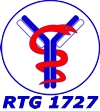MD TP50: Transcriptome profile of endothelial cells induced by autoantibodies targeting AT1R/ETAR in systemic sclerosis
G protein-coupled receptors (GPCRs) comprise the largest family of integral membrane proteins of humans, and these receptors are among the most pursued targets for therapies. Endothelin-1 type A receptor (ETAR) has a pivotal role in promoting migration of immune and non-immune cells. A relation between high titers of anti-ETAR, increased levels of natural ET-1 and alteration in ETAR expression has been described in different autoimmune diseases. However, the regulation of ETAR expression on immune cells such as neutrophils, which play an important role in various autoimmune diseases remain poorly investigated.
It is well known that abnormal pro- and anti-inflammatory cytokines produced by T helper (Th)1 and Th2 cells (e.g. IFN-γ and IL-4, etc.) as well as soluble factors such as soluble CD40L (sCD40L) have multiple functions in the pathogenesis of autoimmune diseases. Despite of that, their effects on ETAR expression have not been investigated.
We tested the effect of ambrisentan on cell migration. After one hour in the presence of ETAR antagonist ambrisentan, neutrophils lost their capacity to spontaneously migrate and to migrate in response to fMLP. Considering the essential and non-redundant role that ETAR plays in the regulation of cell migration. Therefore, my project aims to identify modulators of ETAR expression and signaling in neutrophils.

- Projects
- Projects
- Associated projects
- MD projects
- Associated MD projects
- Concluded projects
- Concluded TP
- Concluded Ass.TP
- Concluded MD TP
- MD TP1 - Ig Glycolysation
- MD TP2 - Immunoprivilege
- MD TP3 - ANA antibodies
- MD TP4 - Autoantibody prevalence
- MD TP5 - Treatment of EBA
- MD TP6 - Autoantibody-induced tissue injury
- MD TP7 - Neutrophil signalling
- MD TP7b - IgG-IC-induced signalling
- MD TP8 - The role of IL-33 and its receptor ST2
- MD TP9 - Detection of antigen-specific B cells
- MD TP9b - Detection of antigen-specific B cells in BP
- MD TP10 - Old drugs to block T cells
- MD TP10b - Combination of T cell inhibitory compounds
- MD TP10c - T cell inhibitory compounds (in vivo)
- MD TP11 - Identification of "genetic biomarkers"
- MD TP12 - Combinations of B cell modulatory compounds
- MD TP13 - TREM1 in cutaneous inflammation
- MD TP14 - Signaling in PV
- MD TP15 - Autoantibodies in relatives
- MD TP16 - Drug-induced pemphigoid
- MD TP17 - Keratinocyte lipid mediators
- MD TP18 - Neutrophils + IL-17A-Inhibition
- MD TP19 - C5aR-Inhibition
- MD TP20 - IgG-Subclasses
- MD TP21 - NF-kB in EBA
- MD TP22 - Biochip Mosaics in AIBD
- MD TP23 - Diagnostic Techniques on AIBD
- MD TP24 - Anti-stimulatory effects on Neutrophil-signaling
- MD TP25 - Phage library on systemic scleroderma
- MD TP26 - New EBA-scoring sytem
- MD TP27 - Neutrophil signaling-pathway inhibition
- MD TP28 - Inhibition of Keratinocytes
- MD TP29 - Monoclonal antibodies in EBA
- MD TP30 - Enhancing vaccinations under Immunosuppression
- MD TP31 - Non-desmoglein autoantibodies in PV
- MD TP32 - Neutrophil adhesion
- MD TP33 - MicroRNA-21 in BP
- MD TP34 - PI3K-subunits in EBA
- MD TP35 - Signaling cascade inhibition in EBA
- MD TP36 - Signaling cascades in keratinocytes
- MD TP37 - AT1R-antibodies
- MD TP38 - Cell migration regulation
- MD TP39 - mACh-Receptors in systemic sclerosis
- MD TP40 - Hair and EBA
- MD TP41 - CMV-specific T cells
- MD TP42 - Necroptosis in GPA
- MD TP43 - Neutrophils and NETs
- MD TP44 - Mitochondrial genome in AIBD
- MD TP45 - Target antigens in pemphgoid diseases
- MD TP46 - Alpha-adrenoceptors in Raynaud´s phenomenon
- MD TP47 - T cell-receptor-sequences in autoimmune skin diseases
- MD TP48 - Epitope specificity and glycolization
- MD TP49 - Inhibition of keratinocyte-dissociation
- MD TP50 - Transcriptome profile of endothelial cells induced by autoantibodies targeting AT1R/ETAR in systemic sclerosis
- MD TP52 - Expression of B4GALT1 and ST6GAL1 ....
- MD TP54 - Reactivity of serum antibodies ....
- MD TP55 - Identification of potential therapeutics .....
- MD TP56 - Validation of the inhibition of different signalling pathways ...
- MD TP57 - Inhibition of IFN-γ as therapy for epidermolysis bullosa acquisita
- MD TP58 - Characterization of immunoglobulin G subclass distribution ...
- MD TP59 - Development of an experimental pemphigus vulgaris model in adult mice
- MD TP60 - Interactions between GPCR and anti-GPCR IgG autoantibodies...
- MD TP61 - Glycosyltransferases B4GALT1 and ST6GAL1 in...
- MD TP62 - Sensitivity of diagnostic test systems in dermatitis herpetiformis Duhring
- Concluded Ass. MD TP






